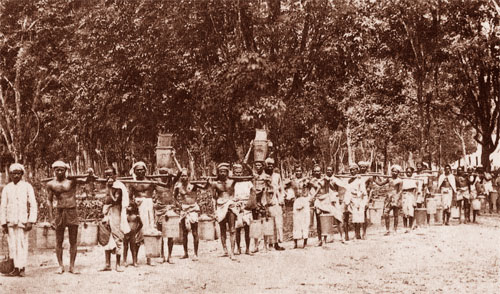
So that, Dr Lourdesamy, is your real Indian problem. The Indian problem is the Malays were not starving and/or homeless. Hence they refused to work like African slaves in America. So the British gave these jobs, which the Malays refused, to the Indians from India and Ceylon instead. If just the Malays were not “lazy” then your ancestors would have been left in India and Ceylon instead of being brought over to Malaya and treated like slaves.
NO HOLDS BARRED
Raja Petra Kamarudin
Free Malaysia Today came out with an article today titled “The Indian problem – what are its roots?” (READ THE ARTICLE HERE)
Yes, I, too, studied history, so I know the problems that Indians face — and to quote Dr I Lourdesamy, the writer of that article, “How different was this to the way the Africans were brought to America to be slaves?”
There are many things Dr Lourdesamy said in his article, and I suggest you read it. However, what Dr Lourdesamy did not mention in that article is that these Indians were initially estate workers in India and Ceylon in the British-owned tea and cocoa plantations (before the British moved to rubber).
Then these plantations were infected by a blight (and once this blight affects the plantations the entire land becomes useless, so replanting was not an option). The British had to relocate their plantations and Malaya was the closest in conditions to India and Ceylon.
But there was no way the Malays were going to work like African slaves in America. In their own way the Malays were rich (by kampung standards) and could live off the land. They could fish, plant padi and vegetables, plus harvest durians, rambutans, mangosteens, and all manner of fruit, from their dusuns. Homeless Malays (like the whites in the UK and US) and starving Malays (like in India and China then) was unheard of. The Malay ate well and slept well. Every Malay had food on the table and a roof over his or her head.
READ MORE HERE: (BBC) — The horrific consequences of rubber’s toxic past
So here we had a situation where the British had huge cocoa and tea plantations (and later, rubber) but no workers. The Malays were too “lazy” to work like African slaves in America. Then the British came out with a brilliant idea. The Indians in India and Ceylon were experienced plantation workers (while the Malays were not, anyway) and they do not mind being treated like African slaves in America (while the “lazy” Malays would rather eat and sleep).

Eventually, the Indians gained a reputation of being “hard” estate workers (worth their weight in gold) while the Malays gained the reputation of being a “lazy” race for refusing to work in terrible conditions in the estates. And the British had a high opinion of their hardworking estate workers, and a low opinion of the lazy race which their ruled over.
Then the British negotiated Merdeka with the Malays. But the British had one problem. What to do with the millions of Indians they brought into the country? They could not send them back to India and Ceylon and there were not enough Council houses in East London, Birmingham, Bradford, etc., to house these people.
The British then came up with a brilliant solution. Abandon them in Malaya. But to do this they first had to get the Malays to agree that Malaya will “absorb” the Indians. In fact, this was one of the terms of Merdeka: the Malays must absorb the Indians and Chinese and grant them citizenship to be given Merdeka.
The Umno leaders of that time were either bribed by the British, too stupid, or desperate for Merdeka — because they agreed to this and overnight the Malays, who were more than 95% of the population, dropped to just 50%.
So that, Dr Lourdesamy, is your real Indian problem. The Indian problem is the Malays were not starving and/or homeless. Hence they refused to work like African slaves in America. So the British gave these jobs, which the Malays refused, to the Indians from India and Ceylon instead. If just the Malays were not “lazy” then your ancestors would have been left in India and Ceylon instead of being brought over to Malaya and treated like slaves.



No comments:
Post a Comment
Note: Only a member of this blog may post a comment.